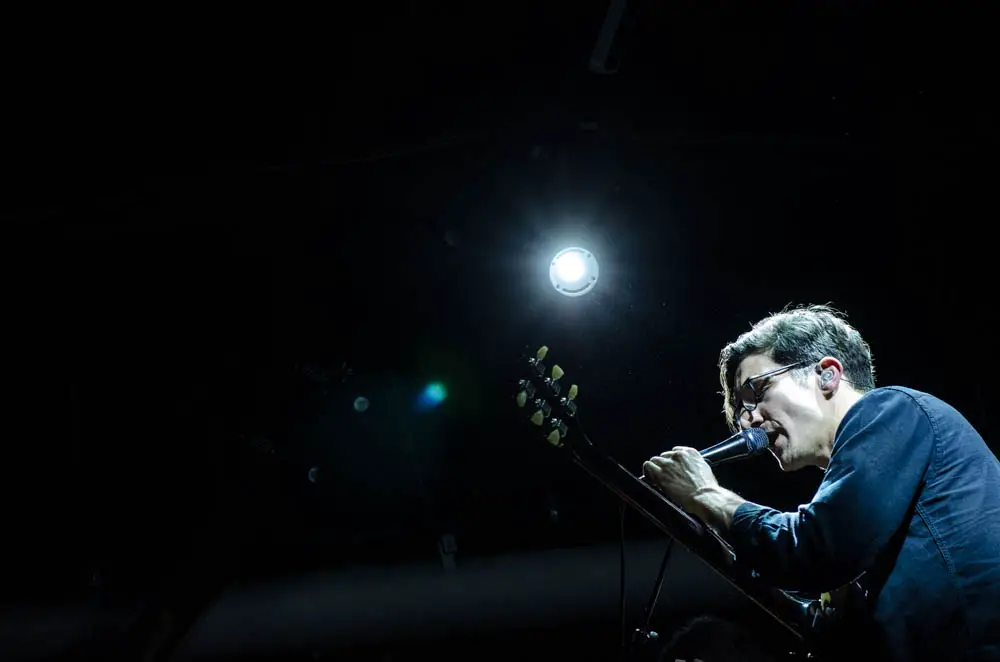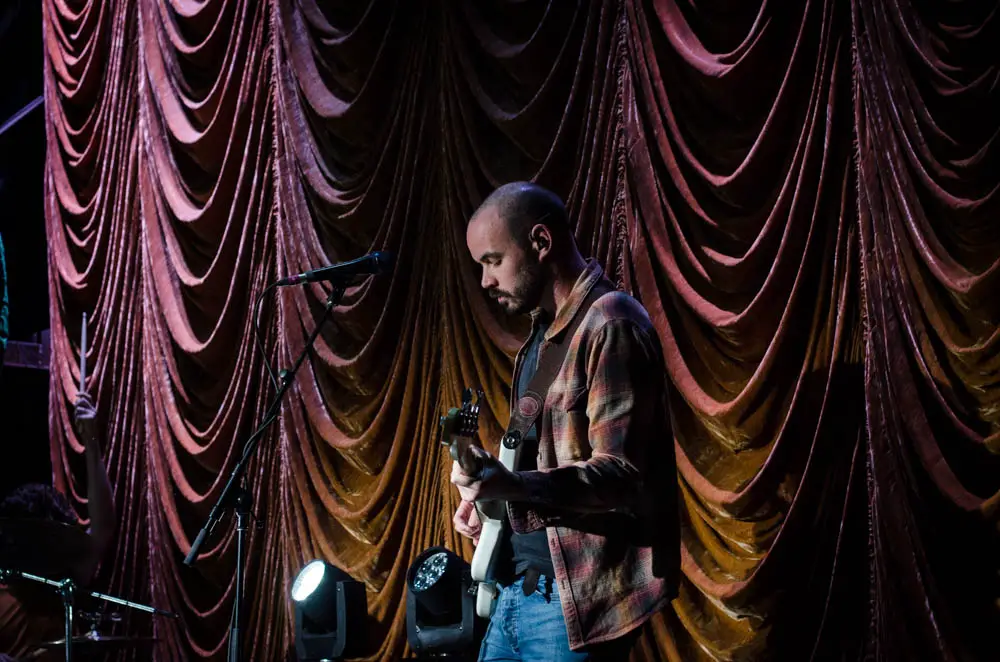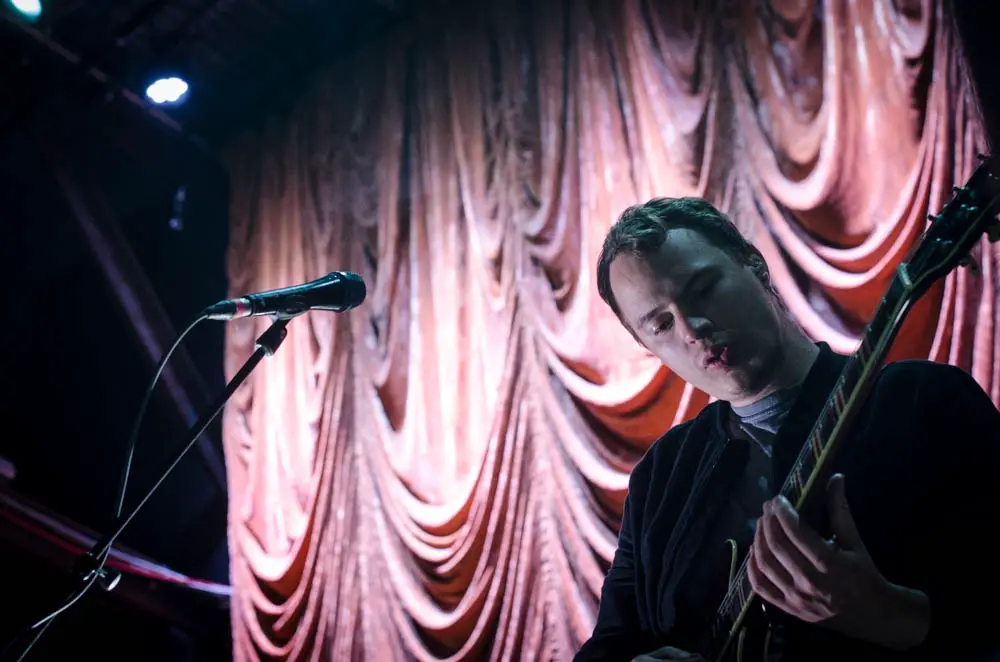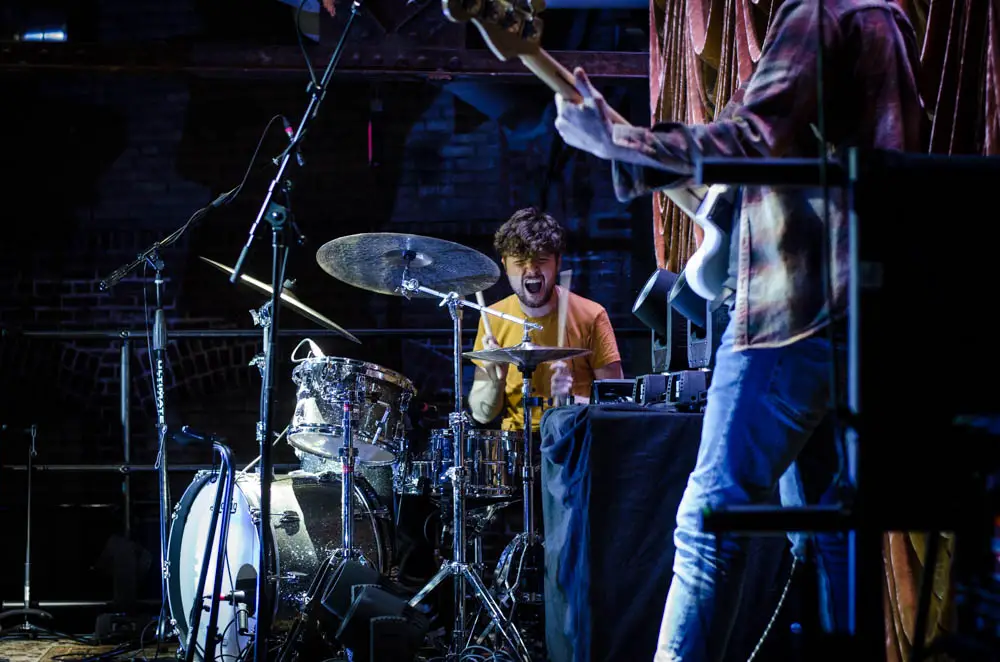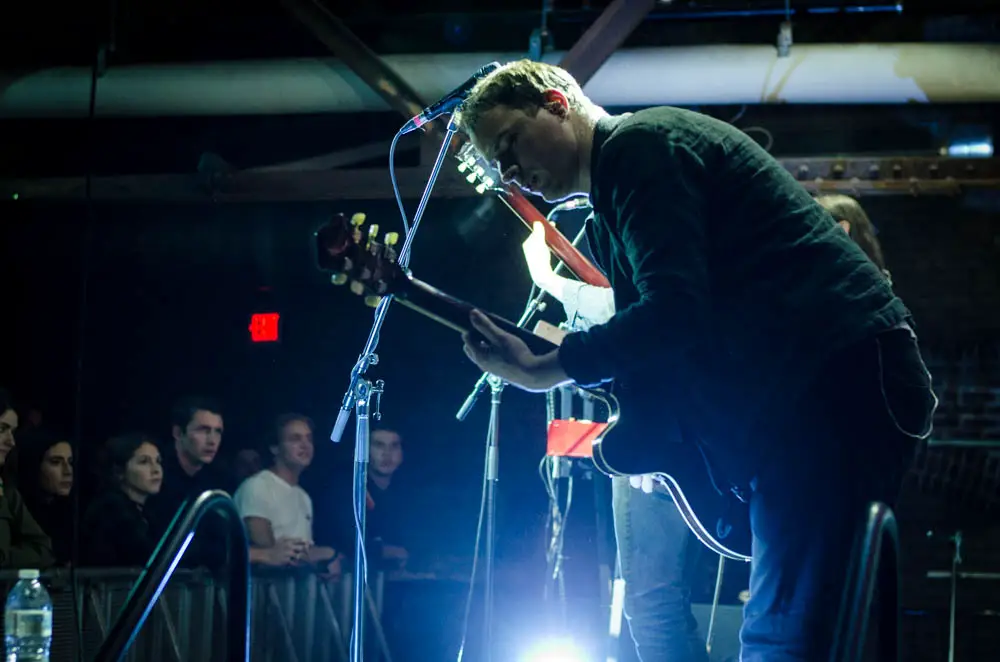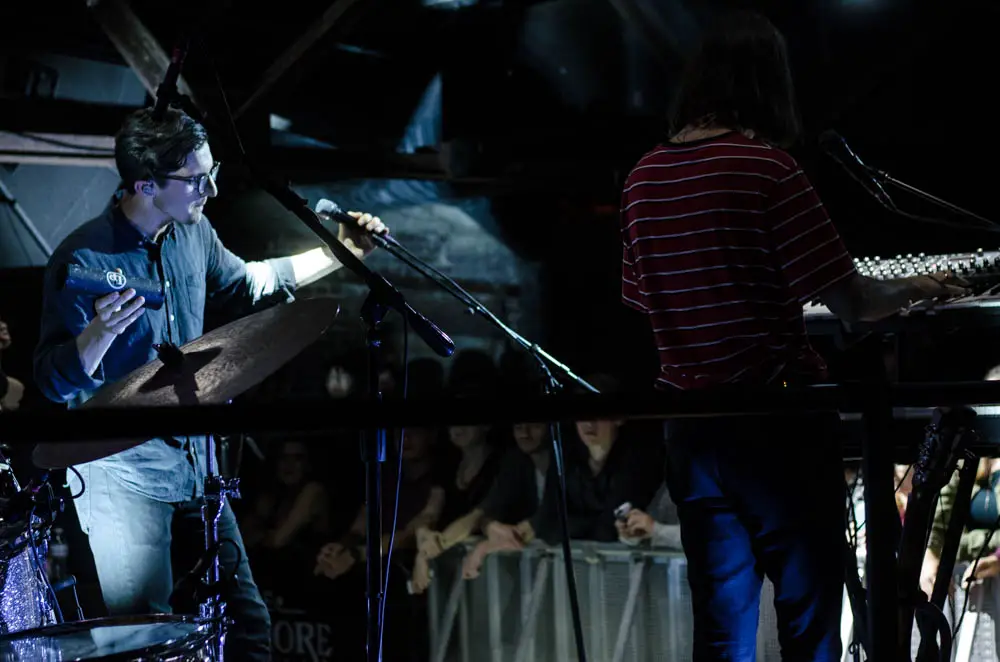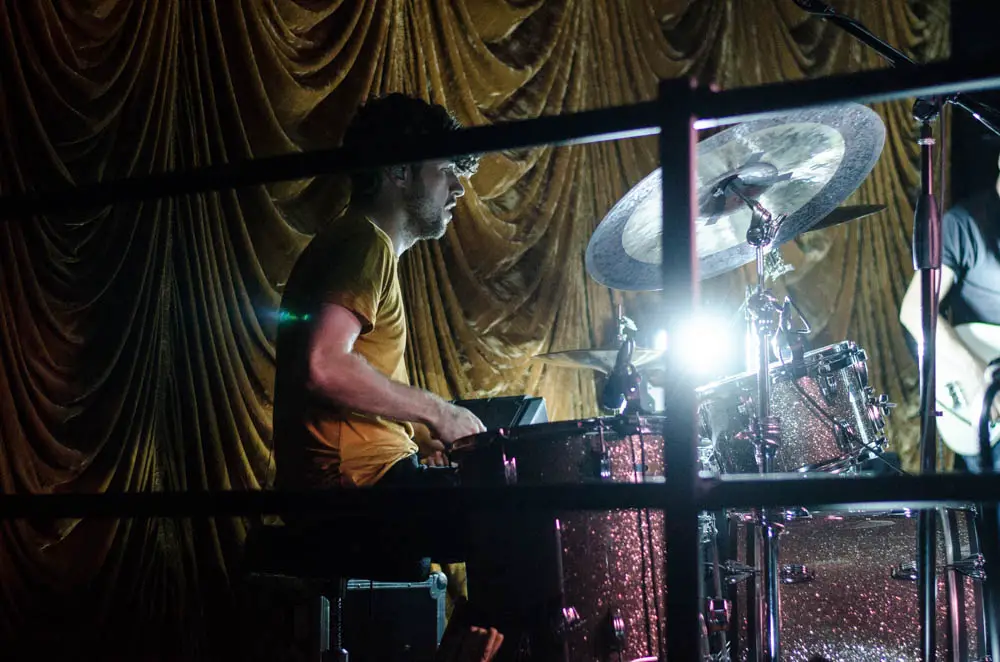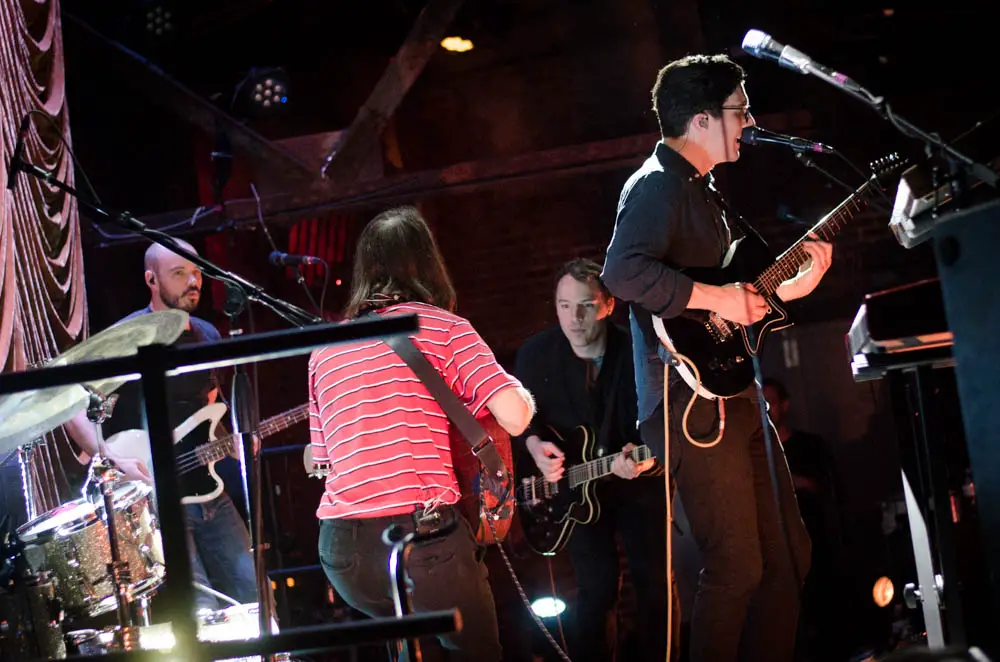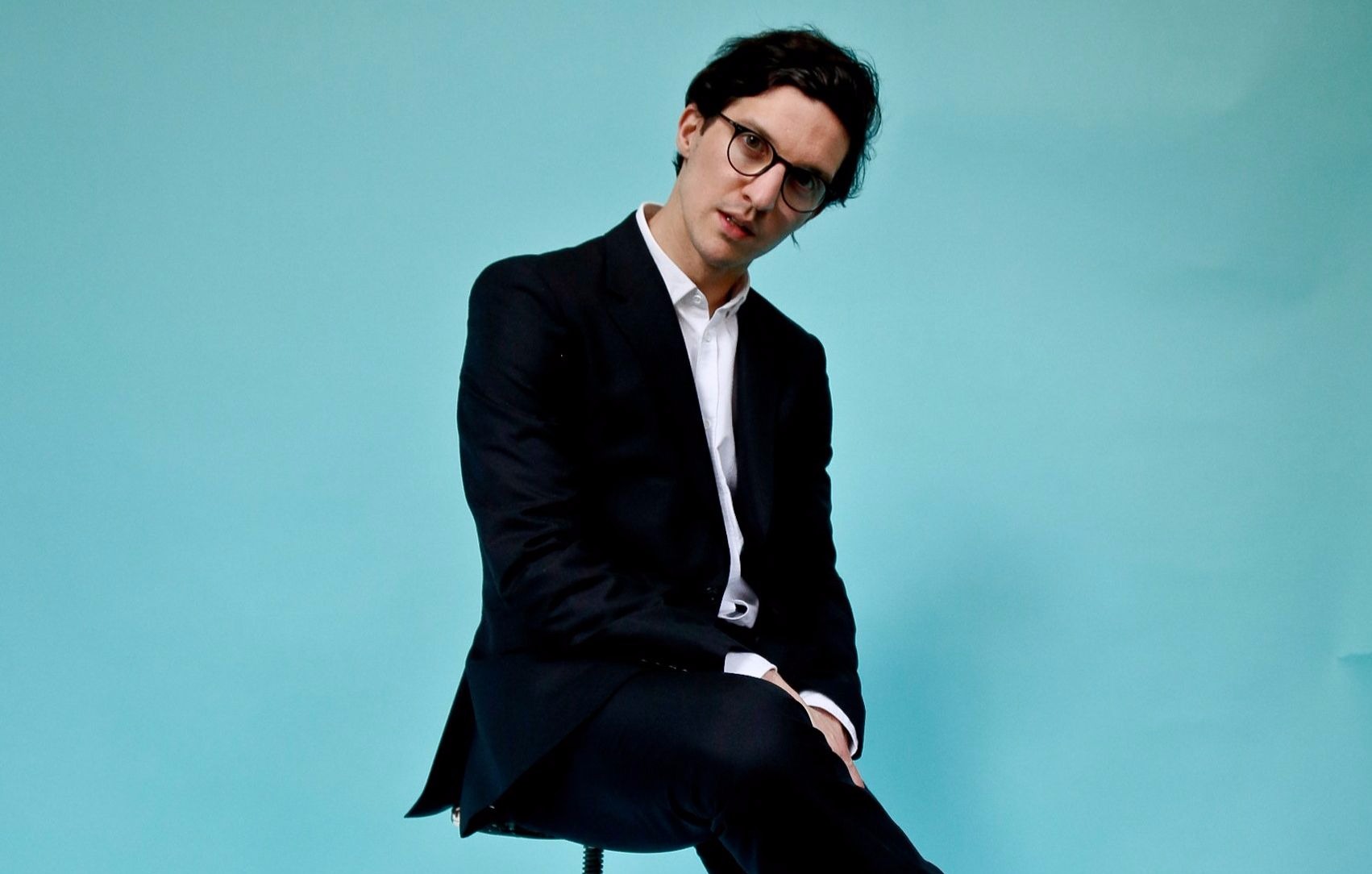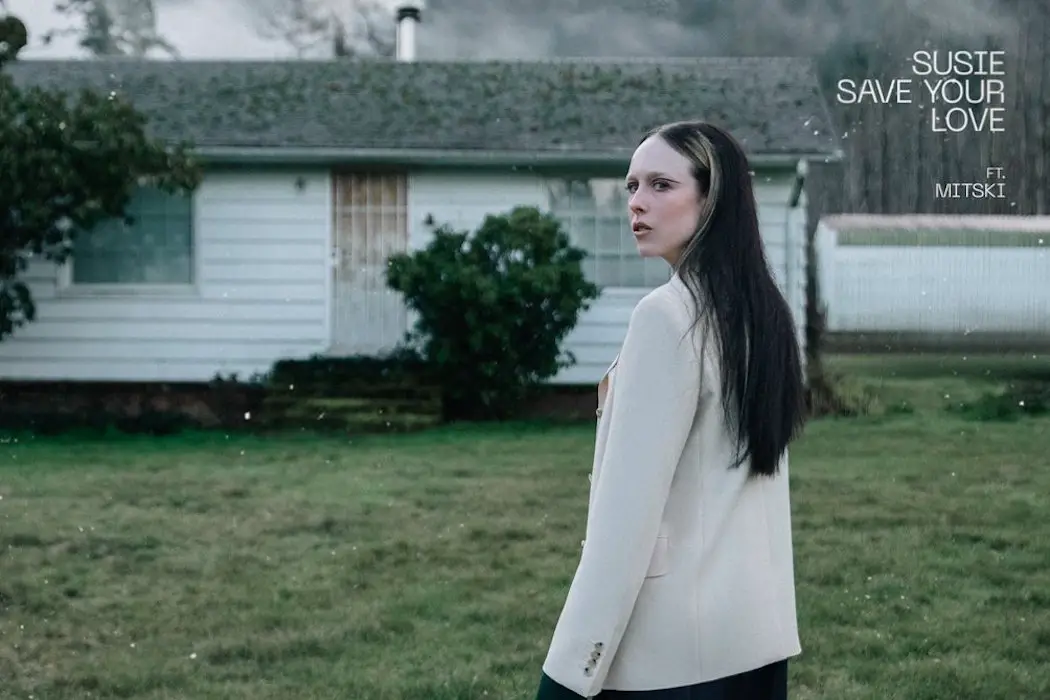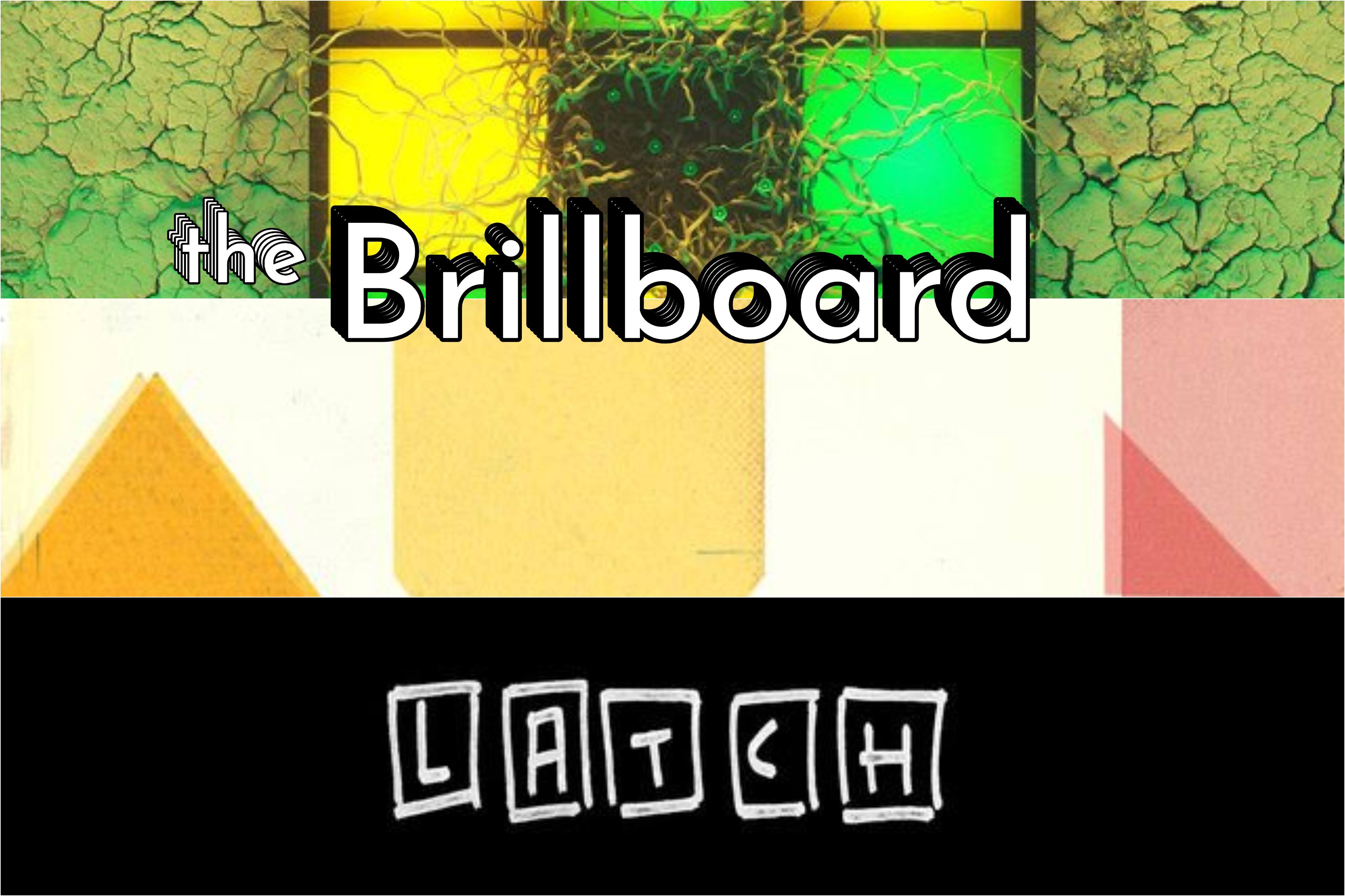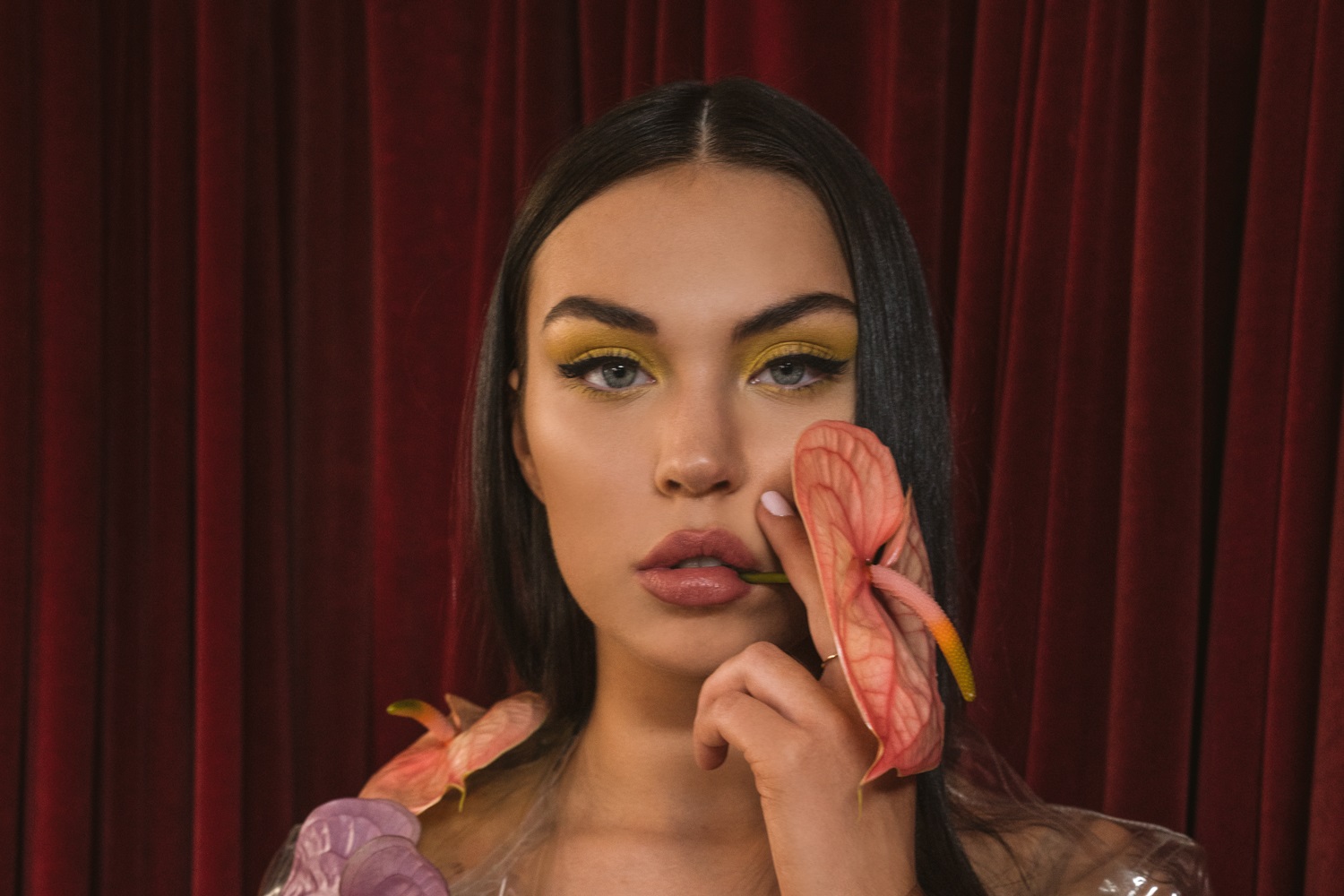He is right; the music industry today has become a chasm of hyper-competitiveness amongst artists, and it can feel near-impossible to make an impact.
But, Dan Croll has.
Croll’s illusory 2014 debut record, Sweet Disarray, introduced the singer to the world as a unique and charming presence; Croll’s inherent knack for song-making, particularly through dynamic instrumentation, proved he deserved to be noticed.
And, he was. “From Nowhere,” one of the leading singles off of Sweet Disarray, skyrocketed in popularity. To date, it has a cool 27.3 million streams on Spotify alone. Inevitably, Croll found himself on a slew of different playlists and radio rotations, subsequently filling up festival slots and theaters around the globe.
Now, three years and label switch later, Croll reemerged into the ether with his sophomore album, Emerging Adulthood (released July 21st). Emerging Adulthood finds beauty in pain; navigating life and its troubles through stunning différance. There is a palpable self-awareness within all of Croll’s songs that grasps onto its listener, assuaging them with sympathy.
Dan Croll embodies authenticity through and through. He has been refreshingly raw about the struggles he’s faced in recent years, and his honesty in life is ultimately reflective in his dynamic musicianship. Croll knows that although it might not be easy, it is still worthwhile.
“I think it’s about being personal and relatable, but at the same time trying to surround it with music and production that can feel uplifting,” Croll notes.
Watch: “From Nowhere” – Dan Croll
A CONVERSATION WITH DAN CROLL
Atwood Magazine: Well, you’ve been making music now for a long time, and you have the two albums out now; what are some things that you’ve noticed, trends that you’ve noticed in the industry, as you’ve progressed over the last couple of years? Has anything remained consistent, or has it been constantly changing?
Dan Croll: I mean, it’s consistently tough. It’s still a brutal industry. But, I mean, just the way that people digest music now — if you mean that way?
Any way!
Dan: Yeah, well, people listening — obviously there’s been like, since I started in 2010-11, Spotify has absolutely taken off, so I think it’s based on that. And you’ve seen bands like Oh Wonder do the whole thing of like, one track a month. And you know, that’s a sign that maybe the album’s having a tough time; you know, when people are putting out twelve songs over twelve months, it’s no longer needed as a physical body of music, and people are digesting singles more than albums. So I think that’s probably the biggest thing. I think that because of that, and because of the sheer amount of competition in the industry, I think the battle has changed from being like, an intangible artist, where they’re like, really big, and no one can really touch them or speak to them, that you kind of admired from afar. I think whilst that still remains, I think it’s switched a lot, where artists now need to be even more tangible, and be very accessible, because that’s the battle: to keep the focus, to keep the attention. It’s just a heated industry!
I see you on social media, too, and it seems like you’re keeping up with it pretty well!
Dan: Yeah! I think so, yeah. Well, I’ve just given people my number, so that could be working.
I mean, yeah, also the “Dial Dan” thing.
Dan: Yeah, I don’t think it could be any more direct than that. That was — I didn’t do that just to keep an attention, that was something that I think was very important to me, to have people just talk and stuff like that. So, as much as it’s done that job as well, it wasn’t solely just to be “ticking boxes” or anything like that.
Right. How often do you do “Dial Dan?” Every couple months?
Dan: Yeah, I usually turn on the phone like, one week Monday to Friday, every month. Sometimes it’s been a little longer, but it’s usually around there. I think I’ve done about four or five now.
All day?
Dan: All day. Kind of, from when I wake up, until I go to bed.
People ringing you whenever? Interesting.
Dan: Yeah, definitely, it’s because of all the time zones as well.
I think just my music has somehow traveled, which is brilliant, and I love that.
Do people call from all over the world too?
Dan: Yeah! All over, to be honest.
I feel like that would get expensive for them.
Dan: Well, that’s the thing, is that it’s on like, WhatsApp Audio, and FaceTime Audio, and stuff like that. So, people can call and not get charged. I’m not making any money out of it!
You're not just charging people to talk to you!
Dan: No! Thankfully not.
It’s like Charlie Brown; charge people a nickel for everything.
Dan: No — yeah, I wish actually! I should probably monetize it… No, I couldn’t. It’s just nice.
It’s emotional payment!
Dan: You know, to be honest, being in the U.K. and doing it at home — more people call from all over the world.
Do you think there’s a reason associated with that?
Dan: I think just my music has somehow traveled, which is brilliant, and I love that. I think that comes down to adverts, and stuff like that. We’ve had a lot of things over here in America, and around Europe.
I heard you in a random bar in downtown Philadelphia the other day.
Dan: I don’t know how it happens, but I’m really thankful for it. And I think of that whole “accessibility to artists” as well. If you think about like, the likelihood of me touring South Africa, or Indonesia, or China, and reaching these kind of smaller towns and stuff like that — not even big artists go there. As much as I’d love to go everywhere, I can’t. I’m trying my best, but I can’t, really. And so I think it’s this thing of, them seeing an artist that they follow, and they probably realistically know that they don’t have a good chance to see; suddenly, there’s this kind of line direct to them. So I think it’s that thing of like, just jumping on that. So I have a lot of people that I’ve talked to from South Africa, Indonesia, South America; loads of people from small towns, middle of nowhere, being like, “Oh my god, we don’t get this.” So, that was a big thing.
That’s incredible! Where is one place that you’d want to go? What are the top 3 places that you’d want to visit that you haven’t been to yet?
Dan: I’d love to go to Japan — Tokyo, obviously.
Well, yeah, there’s a whole song…
Dan: Yeah, and I’m going on holiday to Tokyo, actually, in November.
Yay!
Dan: It’s my first holiday in like, 5 or 6 years.
Listen: “Tokyo” – Dan Croll
That’s the perfect place to go!
Dan: Yeah, so, Japan; South Africa – I went to Durban once, and it was stunning, and I know that there’s even more stunning places there; and South America as well. I would say America, but, I’ve been here.
Well, yeah. Where’s one place in America that you’d want to visit? Or, where is the most random place you’ve visited?
Dan: The most random place? That we played a gig?
Or had the day off! I guess both.
Dan: Well actually, I’ll tell you what, we did some kind of mega-drive, kind of coast-to-coast, and we ended up going through Texas. And we were just driving for hours and hours through desert without seeing anything. And then there was one gas station that we stopped at, just a one-off, and there were just these two really funny old women who were just chatting to us for ages; “Oh what do you do? You do music!” and stuff like that. So I ended up running back to the van and giving them a vinyl of the first album. And she — she ended up putting it up on the wall, and I don’t think she really understood that it was a vinyl, and so she just, behind the counter, held it, and then took a nail and a hammer, and just went [through it]. Shot it straight through, and put it in the wall. So I get a lot of joy thinking about how, behind the counter at this random gas station in Texas, is just my face, with a nail through it.
It was through your face?!
Dan: It was just above the top of my head. I get a lot of enjoyment out of that. You know, whenever we come over here, and I kind of remember —
You should try and find it again!
Dan: That’s the idea! That’d be really fun.
Are you going down to Texas?
Dan: Not on this run, no. So, another time.
Another time! The longer it is, the more exciting it will be, if it’s still there.
Dan: It probably won’t; it probably will just be abandoned or something.
Oh no! Well, your face will probably still be there!
Dan: Hopefully!
Well, if it’s abandoned, they probably just left it.
Dan: [Laughs] I am alone, in a gas station.
In the middle of Texas, in the desert. Maybe that’s a metaphor for something, I don’t know.
Dan: Probably, probably.
Whatever, it’s fine! And, speaking of meanings and metaphors, your songs are very evocative, and tell a story. Everything seems very cohesive, in a way, and I don’t know if that was intentional or not. But do you have a favorite lyric of yours, that means something particularly special?
Dan: On this album?
Anything!
Dan: I mean, there’s some off the first album. The track, the title track, “Sweet Disarray.”
That’s my favorite song of yours, hands down, of all of the ones you have.
Dan: Thank you very much. That song is a very personal one, because it was about my experiences with my grandma going through dementia, and so there’s a lyric, “My mind has given way to an age that’s coloured gray.” And it’s just kind of about your brain giving in to getting old and stuff, and so I think that’s a lyric that I’ve been kind of proud of, in a way. I’m not a big fan of my own lyrics, to be honest.
Listen: “Sweet Disarray” – Dan Croll
Why not?
Dan: Because I — I think in general, I still am nowhere near I think I can be, in terms of…well, actually in every aspect.
Well, fair, you’re always growing.
Dan: I think, you know, I could produce a lot better music, and especially lyrics.
Well, you did win a songwriting competition though!
Dan: Yeah, yeah…
So you did do something right!
Dan: I think I’m just hyper-critical.
Well, that’s fair, you’re allowed to do that. Do you find that you’re more of an instrumentalist, then, and then lyrics come after?
Dan: I think so, yeah, definitely. But lyrics are something I’ve gotten into more, and when I listen to how I’ve digested music, I enjoyed the instrumentation and the sound and the production. I think only recently I’ve started to really get into lyrics. So, I think, that will hopefully progress with what I produce now.
It’s a beautiful thing to be able to play an instrument, I think.
For sure! And, speaking of instrumentation as well, I know that you play almost everything - is there one that you don’t play that you’re like, “I’m going to try that next time around.” Or, do you kind of just pick up an instrument, and you’re like, “I can do this.”
Dan: I can do it — I don’t know, I guess I kind of just pick them up and…
Force yourself?
Dan: Yeah! I’m very competitive with myself, and I think that when I have something in front of me, and I’m like, “I don’t know how to play this, but I’m going to.” It’s just like, watching tons of YouTube videos and tutorials. It’s usually when I’m not on tour or in the studio or something, I spend all of my time on YouTube watching tutorials.
Did you do that in school, too, just kind of force yourself to learn instruments all the time?
Dan: Yeah, well, no, I think my mom and dad, with me and my brother and my sister, I think that they think that every child needs one instrument, and I think that they really believed in having an instrument in a kid’s life, and to dedicate a bit of time to that, as a hobby, or something. And I agree with that!
Well, it worked for you!
Dan: It’s a beautiful thing to be able to play an instrument, I think. And they were also very welcoming of my kind of impatience, I guess. So my first instrument was a trumpet, when I was really young. And I didn’t get bored quickly, I was just never excited. It was like,“oh, alright, I can do the basics, so I’m going to do something else now.”
So you hit the base of what’s acceptable, and moved on.
Dan: Yeah, exactly. The bare minimum; which is probably a metaphor for my life .
Same, I think.
Dan: Yeah but you know, they were just kind of strict in the way where they were like, that’s okay, but if you want to learn another instrument, you’ve got to sell the old one, so you can emotionally detach yourself from it, so you can get the next one. And so it was this thing of like, buying one, selling the other, buying one, selling the other.
Watch: “Home” – Dan Croll
You break even, that’s okay!
Dan: Yeah, and it was good because I wasn’t just letting things dust away in the corner. I treated things equally.
Do you wish you still had some of that stuff now, though?
Dan: Yeah, well I’ve like, bought a bit of it back. I haven’t bought a trumpet back; that’s a tough one to pick up again.
I feel like any wind or horn instrument is hard to pick up again.
Dan: Yeah, and they sound like shit if you don’t know how to play them right. I think things like trumpet, and violin, like, when you’re starting out on those instruments, it sounds awful. But when you can play them, you can really play them, and they sound beautiful. I’m not even going to try the violin. I think my next one — and I’ve been watching a couple on eBay, that’s usually how it goes– I’d love to buy a double bass, I’d love to try my hand at double bass.
Nice. So, then, you came out with the new album in July, and I overheard you saying that you started with drums first - do you think that helped you? And you spent six months in Atlanta working on this?
Dan: Well, I spent five months in Liverpool writing, and demo’ing it, and then two months in Atlanta.
Do you think that starting with instrumentation sped up the process for you, in terms of making your songs?
Dan: I think by the time it got to Atlanta, I had gotten them in a good place, so it sped up in that respect, so then I could spend five months confidently building up songs. And, yeah, it speeds up the process, being able to just jump onto instruments and do those things. Otherwise, it’s time spent, time and money spent getting in session musicians, getting in friends, and it can be tough and expensive. And so for me, I wanted to be as self-sufficient as possible; so, yeah, I spent five months getting those demos to the best place that I could do, and then take them to Atlanta and having Ben [Allen, the producer] put his touch on them.
Very cool. So did you have any of the touring guys help you do any of the instrumentation, or was it all you?
Dan: All me. And it was funny, because Ben was really understanding of me, and what I was like in the studio, and how driven I was to do this all myself. And he knows that I don’t play all of these instruments the best, you know, I know “the bare minimum.” And it was funny, because he realized a kind of way that he could motivate me, and it was quite a hardball way of doing it; but when I was playing the drums, and recording the drums, and I wasn’t playing the best, he’d just get on the microphone and talk through my headphones like, “So, I’ve got this friend, Trevor, and he lives down the road…he’s a roofer! And I’ll tell you, he’s really good at drums. And I reckon I could just get him in, and you could probably knock this out in about ten minutes.” And I’m like, “No!” So there was this kind of like, reverse psychology.
Forcing yourself to get it done, absolutely!
Dan: Right, yeah. And I swear he was just making up names every time; like, “Oh yeah, Caroline, she’s really good on acoustic guitar, and she finishes work in a minute…” And I’d just be like, “Screw you, Ben. Don’t you dare call her! Don’t you dare!”
What if he had called someone anyway, and they showed up ready with their guitar?
Dan: Thankfully he didn’t, because he knew I’d flip out.
I think it’s about being personal and relatable, but at the same time trying to surround it with music and production that can feel uplifting.
Oh, good, he’s understanding. That’s good! So, then, why does music matter to you? What drives you to continue making music?
Dan: I think it’s a mixture of things. I can’t do anything else — that’s a big thing. And that’s not to make it sound like music doesn’t mean anything to me, because it means a massive amount.
I’ve heard that before!
Dan: So much so that I didn’t really do great academically. And sports were a huge part of my life.
That was your thing!
Dan: That was my thing, and then it abruptly ended, and then I couldn’t get back to the level that I was doing, so it’s kind of like, music is all I have. And I love it, you know, that helps. I think people enjoy it, and I don’t know how, and I don’t really understand people that travel so far for shows, and we get to travel so far for shows. And it’s that kind of drive of like, making people happy, and people connecting to songs; there is something quite magical, and you know, like I said, I don’t understand it sometimes, it’s a bit of a pinch-yourself moment sometimes. And, yeah, I get a kick out of being a provider as well. I think that there’s something family-oriented; just kind of looking up to my mom and dad, and family members who really work hard to provide, and who enjoy being the provider. I think that I’m responsible for my six closest friends of like, eight years.
You're like tour dad.
Dan: Yeah, in a way! But if I’m not gigging, and I’m not bringing money in, then they’re not getting paid. They have lives to upkeep and stuff; so, it’s stressful, and as tough as it can be at times, if things do go quiet, at the same time if we’re all touring and stuff, it feels great to be able to provide.
For sure! And you kind of touched on this a little bit, but what message do you want to convey with your music? What do you want people to take away from it?
Dan: I just want them to connect. I think, for me, everything I do is personal. If it’s not personal, it’s not worth doing, for me, because I don’t get any enjoyment out of it if it’s not personal. Music is a form of ventilation, I guess, for me, and it allows me to get stuff off my chest, and speak out. And at the same time, if there’s people that are going through the same thing, they can connect to that lyrically. But at the same time, I realize that topics that I might cover, especially maybe with this second album more with like, the mental health and stuff, and my personal health; it can be a little bit negative, and you’ve got to be careful that you’re not making anyone depressed listening to your music. So for me, I think it’s about being personal and relatable, but at the same time trying to surround it with music and production that can feel uplifting. So I guess that’s what I want them to take away from it; I want them to connect, but also feel that by the time the song’s finished, feel more comfortable, or more motivated in their position.
Nice. Is that why you called the album Emerging Adulthood, because it was kind of like you navigating your own mental health?
Dan: Massively, massively. I hit a real brick wall after the first album, and I’d never dealt with any of that before, I’ve never had any problems with anything in that respect, until quite abruptly a couple years ago. So, it was this thing of like, is this what I want to do? Is this worth it? Do I have to go through it every time I release an album? Is that how the industry is? All of these questions, and doubt, and whether or not I had it in me mentally and physically, whether I could do it. So, it kind of felt like this coming-of-age, really, where I was like, alright, I’ve got to make a choice: is this what I do? Is this me? Am I going to be more of a mature adult about this, and how I see myself living life? And trying to build relationships, and have kids and stuff, can I do that, being a musician? So it was all of this kind of, further-down-the-line questions.
All in the long term!
Dan: Yeah! Like, is this the life? And, it is.
I was just going to ask if you figured it out.
Dan: Yeah, it is. But the album title came from the book I was reading during that period, that a friend recommended me, called Emerging Adulthood, by an American author [Jeffrey Arnett]. And I think I related to it, because he used “emerging adulthood” as like, a phrase for this generation now, and we’re a part of them, where you leave high school or college or university, and now more than ever, there are an infinite amount of possibilities and opportunities out there, because technology and how affordable it is; and travel, and suddenly the world is such an open and accessible place that I think a lot of people either are excited about that, or it’s super intimidating — and I think that’s what it was for me. It was like, I stopped sport very abruptly, went into music, came out of university, got a record deal, started touring, and then was like, oh my god, this is mad! This is crazy. So whilst I was reading that book, I related to it, and I was like, yeah, I’m quite intimidated by the world at the moment.
That’s fine though!
Dan: Yeah, no, so it was good, and that’s kind of how it I guess came to fruition.
Sure. Do you think that you - personally, I think that the best way that I work is setting myself on fire and figuring out how to put it out.
Dan: Problem solving!
Do you think that’s kind of the same for you?
Dan: Yeah, massively. I think I’ve gotten a bit better at that now, but it’s definitely just throwing myself in the deep end, I guess.
And learning how to swim!
Dan: There we go.
Perfect. So I guess to wrap up, what is the best piece of advice that you’ve received, from anybody? Whether it’s related to music or not, something that’s driven you and pushed you forward?
Dan: It might sound a little bit cliche and a little bit wanky, but I really connected to an album title by George Harrison, All Things Must Pass. And I think that that sentence, “all things must pass,” is brilliant, and I think that it’s because it’s two things: it’s motivational, because you know, even if you’re going through the shittiest time, it’s going to pass at some point, and so there’s that motivation that everything is going to work out, and it’s okay; “all things must pass.” And then also, I think it also keeps you humble and on your feet as well, because you know, even if everything is going brilliantly, and everything seems perfect, you’ve got to keep your wits about you, and you’ve got to be prepared and you’ve got to be accepting that it’s going to end.
— — — —
:: purchase/stream Sweet Disarray ::
:: purchase/stream Emerging Adulthood ::
— — — —
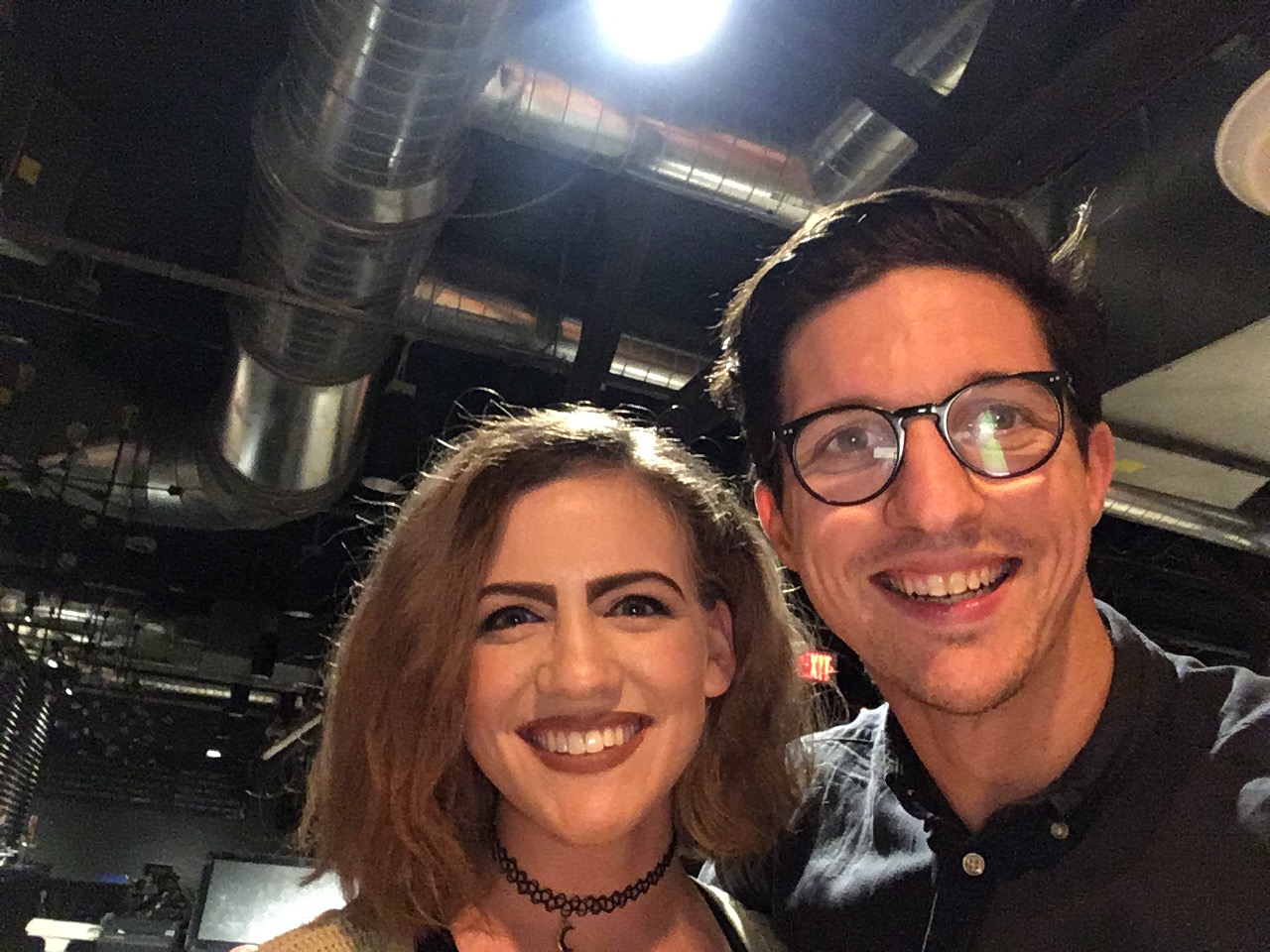
Connect with Dan Croll on
Facebook, Twitter, Instagram
Discover more new music on Atwood’s Picks
Cover photo by Derrick Santini
